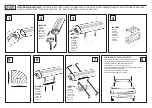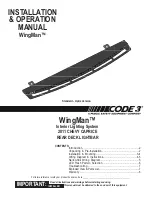
Page
129
Figure 20 Fuses
1.
Battery/headlamp circuit fuse
2.
Ignition/wiper circuit fuse
3.
Rear/side light fuse
4.
Heated rear window/spare fuse
5.
Fuse cover with spare fuses
Horns
Twin (high and low tone) horns are fitted within the duct
moulding behind the radiator grille. These are secures by two set
screws, nuts, washers and lock washers. (Figure 19)
If the horns fail to operate first check the wiring. Horns are not
serviceable and must be replaced if faulty.
Windscreen wiper motor and blades
Description
The windscreen wiper motor is located inside the vehicle above the
passenger foot well (behind the glove box). It is a single-speed type
incorporating a self-parking facility which drives two wheel boxes by
means of a cable rack and pinion running through bundy tubing.
Routine maintenance
To ensure sufficient wiping keep the blades in good condition. The
windscreen should be kept clean at all times to prevent damage to the
blade rubbers and to avoid scratching by grit trapped in the rubbers.
Oil, tar spots etc should be removed from the windscreen using
methylated spirit, sparingly as it can discolour the paintwork. Silicone
or wax polishes must never be used on the windscreen as these smear
badly. An unsatisfactory wiper action or complete failure may be
caused by a mechanical or electrical problem, remedial procedure
being described as follows:
Mechanical
A badly kinked or flattened rack bundy tube will prevent the rack
cable from traversing freely, therefore restricting the movement at
the wheel boxes. The tubing must be re-formed or renewed and must
have a radius of no less than 228 mm (9 in). Check the wheel boxes'
spindles for freedom of rotation. A seized unit or one with chipped or
worn teeth should be replaced.
Electrical
Check the wiring connection is secure in the limit (parking) switch in
the motor and ensure the voltage supply is adequate. A delay or
failure of the blades can also be caused by a faulty switch which
should be tested by substitution.
If all other electrical and mechanical components have been inspected
and found to be correct the wiper motor may be faulty. These are nor
serviceable so a replacement will need to be fitted.
Operation 8
To remove wiper motor (Figure 21)
1.
Remove the wiper arms from the wheel box splines.
2.
Disconnect the wiring plug from the wiper motor.
3.
Uncouple the cable tubing from the wiper motor by
unscrewing the gland nut.
4.
Remove the two set screws, nuts, washers and lock washers
securing the motor to the fire wall and release the motor by carefully
pulling the drive cable from the wheel boxes and guide tubes.
Replace in the reverse order being very careful not to damage the
drive cable.
Operation 9
Wheel boxes & cable rack - remove & replace
To remove
1
.
Disconnect battery.
2.
Disconnect speedo cable from rear of speedometer.
3.
Pull the fresh air nozzle from the fascia and disconnect the
hose.
4.
Withdraw the fascia just far enough to gain access to the
wheel boxes
(see Section R)
and rack. It is not necessary to disconnect
the instruments.
5.
Remove wiper arms and wheel box spindle retaining nuts,
washers and spacers. Push the spindles back through their locations in
the body.
6.
Slacken the left-hand wheel box clamping nuts and remove
the right-hand box complete with intermediate and overrun bundy
tube.
7.
Unscrew the gland nut on the wiper motor and remove the
left-hand wheel box complete with bundy tube.
Replace in reverse order.
Note:
Before fitting a new wheel box ensure that it is the correct side
as they are not interchangeable, and the wheel box gear and rack
cable are liberally coated with grease.
Rear window wiper (if fitted) - Estate models only
The rear window wiper uses the same type of motor as the
windscreen. Access to the unit is by removing the cover on the inside
of the rear door. The cover is secured by six screws.
Wiper assembly specification
Type
Lucas 14 watt 12 volt
Light running current
1.5 amps
Light running speed
46-52 rpm
Wheel box left-hand
32 teeth
Wheel box right-hand
40 teeth
Instruments and switches (Figure 22)
Speedometer
Located to the right of the steering column, the meter indicates the
road speed of the vehicle and incorporates an odometer (mileometer)
to record total distance travelled.
Direction indicator warning light
A green light in the lower right hand quadrant of the speedometer
face (some vehicles will have an amber light). The light flashes with
the indicators when operated. Intermittent flashing (or no flashing)
indicate a faulty bulb or indicator relay/switch.
Summary of Contents for Kitten Estate
Page 15: ...Page 15...
Page 17: ...Page 17...
Page 22: ...Page 22...
Page 26: ...Page 26...
Page 38: ...Page 38 Figure 4 Engine cylinder block exploded...
Page 54: ...Page 54...
Page 55: ...Page 55...
Page 65: ...Page 65...
Page 66: ...Page 66...
Page 75: ...Page 75...
Page 77: ...Page 77...
Page 90: ...Page 90...
Page 92: ...Page 92...
Page 97: ...Page 97...
Page 100: ...Page 100...
Page 101: ...Page 101...
Page 103: ...Page 103...
Page 108: ...Page 108...
Page 114: ...Page 114...
Page 116: ...Page 116...
Page 117: ...Page 117...
Page 118: ...Page 118...
Page 119: ...Page 119...
Page 120: ...Page 120...
Page 123: ...Page 123...
Page 124: ...Page 124...
Page 126: ...Page 126...
Page 130: ...Page 130...
Page 131: ...Page 131...
Page 133: ...Page 133...










































